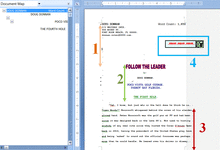 Follow the Leader by Doug Donnan. Follow the Leader tied for first. Through the scoring processes, I gave two bonus points for format. Doug did not follow standard manuscript format so he didn't get the two bonus points. What do you think about that? Was I fair or unfair? 1. The big dots indicate an index. You can see the index to the right. Dough probably doesn't even know it's there. Word does a lot auto formatting. On it's know, this would not turn an editor off. It's easy for an editor strip from a file, however if the publisher doesn't use Word, this might cause your file to look funny. But how can you see invisible formatting?  For starters, turn on show all and you'll see what your file looks like to an editor. Word also has an inspect document feature which will check for tables, water marks... all the things you can't see. A writer should always inspect their document before submitting an electronic file. 2. Don't add color to your manuscript. This is a BIG no,no. -- The publication has a style. Your idea of design and their idea of design probably aren't going to match. -- Reformatting means extra work for the editor. -- There is potential for conflict. Author: I wanted my title sparkly Editor: Dudes, Ducks and Donkey's doesn't do "Sparkles." Author: Well, that's how I want my story. 3. At the end of each line is a hard return. Because this story is formatted so weirdly, I suspect Doug doesn't use Word. Whatever the reason, never, ever put hard returns to create a document that looks like it's formatted correctly. If you can't create the file format the publication asks for, you could query with a short explanation why you can't format it and ask if .rft or .txt file would be okay. Some publications won't mind as long as you have a good reason, but don't be surprised to hear, "no." Selling fiction is highly competitive. Most magazines have a plethora of content to choose from. 4. Graphics. Where he put in the manuscript worked. However, I'd still advise against this. In publishing, graphics are not as straight up as you probably think they are. This graphic was actually two text boxes. To get in on the blog, I had to convert the file to a sing .jpeg and that's on top of everything I had to do get it on the blog. I spent 45 mutes reformatting this entry. Finally, my personal opinion is that despite being well placed, I think the style felt dated and detracted from the story because I stopped to wonder what year this was taking place. _____________________ Beyond format, I think Follow the Leader was a strong submission. I saw some room for improvement later in the story. But I won't talk about them in depth. Aside from being beyond the scope of critique, I don't think these things would actively hinder a sale. This is just a working theory, but I think that certain flaws don't result in "no." If the story is a perfect fit, the editor will be happy to acquire the work. I think the only time these little things matter is when the editor is deciding among a selection of possible yeses. Beyond that, there are other elements completely out of the author's control. Critique groups make us feel like we can overcome these things, but in truth we are always at their mercy. For example lets say this story was formatted perfect. Follow the Leader still might be a hard. There's not a lot of magazine publishing this kind of tale. That's why formatting with a story like this is super important. There are fewer markets who buy this style, only X chances to make a sale. I appreciate Dough letting us take a look at his story. I know that this will help other writers down the road. ps I learned my own lesson about this when I put footnotes in my story, Meat Head, The Worst Dog in the World. I want to thank Ginny for letting us look at her work. I know this will be helpful to a lot of writers.  Ginny has done an okay job with format. One the plus side, she has everything an editor wants: her name, address, email the page numbers, word count and double spacing.
2. She'll left align her address and right aline her page numbers. Here I'f just put of bunch of spaces. You can also input a text box, set tabs, or creat an invisible graph. While it's uncommon for an editor to call her, it does happen. Especially, if the publication is approaching a deadline and Ginny isn't returning emails. Always include a contact number. I've also removed the bold from 1 and 2. Writers want to draw the editors attention to their prose. 3. We're going to put some spaces between the tittle and her personal information. I like to put 12 single spaces or 6 double spaces. There's not set rule here, but your title should start about halfway down the page. 4. The title is centered and the biggest text. It doesn't hurt to make your title memorable. 5. Always put a by line. It may seem redundant but if the author uses a pen name, it's obvious because it's different from the name in the personal information. If the names are the same, the editor knows this author doesn't have a pen name. 6. I like to put for lines, but the exact number doesn't matter. If your unsure, zoom out and see out it looks. An editor should be able to read the title when he or she is doing a preview. *** Later in this tale becomes nested.There are standard ways to format a nested story, but Ginny has chosen non-standard format that means extra work for the editor. It can also indicate other things that Ginny would prefer the editor didn't know about her reading habits. And hey, the assumptions the editor makes about this things could be entirely wrong. But it was your first impression and rarely do writers get the chance for a second impression. The critique Something of Value by Ginny Swart (Original)
Hugh Forrester, Andre’s grandfather, spent most days slumped on a chair in the corner of the sitting room, champing his gums and making loud sucking noises. Sometimes he muttered wordlessly under his breath. Mostly, he stared out of the window, his milky grey eyes fixed on something distant and unseen, with his claw-like fingers rubbing his knees, up- and- down, up- and- down. He smelled stale, although his daughter Meg laid out clean underwear for him every day. Andre’s friends who came to play just grimaced at each other, too polite to comment, but he was mortified that his grandfather had to be seen at all. “Must Granddad sit there all the time?” he complained, “Can’t he stay in his room? He doesn’t even know what’s going on. He wouldn’t notice if you just left him in his room with the door shut.” My Revisions: Andre's grandfather spent most days slumped on a chair in the corner of his living room, rubbing his knees with his claw-like fingers rubbing his knees, up- and- down, up- and- down. As he stared, he champed his gums, making loud sucking noises. Sometimes, he muttered under his breath. Mostly, he stared out of the window, his milky grey eyes fixed on something distant and unseen. He smelled stale, although Andrew's mother dressed his grandfather in clean clothes every day. Whenever Andre’s friends came to play, they were polite, but Andrew always saw them grimace. He was mortified that his grandfather had to be seen at all. At dinner one night after his friends had gone home, Andrew slumped in his chair. “Must Granddad sit there all the time?” he complained, “Can’t he stay in his room? He doesn’t know what’s going on. He wouldn’t notice if we just left him in his room with the door shut.” Why I did what I did. If we want to sell work, we have to look at the business aspect of writing. People kind of look at business as cold and calculating, but the issue is more complex. In the first corner we have readers. These people are not writers and for the most part they don't care about grammar. They want to enjoy reading and be entertained by a story. . In the second corner, we have the publisher. Sometimes the publisher and editor on one in the same, but usually. The publisher wants to make money. His or her job goal is to make a product that people will buy. In the third corner is the author, who wants to make a living writing without compromising vision. And being pulled three ways is the editor who must balance the writers artistic vision with the market (who the readers are greatly affect what kind of content a publisher will buy and what flaws they will accept) and the needs of the company. I've mentioned all this because, none of my changes were arbitrary. Ginny's story is publishable, but it contains structural issues that might make selling it hard. Point of view (POV). There are three characters and the narrator takes all three points of view. However, this in not a case of Omniscient narration. Whether it's first, second, third, omniscient and limited omniscient, whatever POV the writer chooses, he or she must do it in a way that says "I'm in control of the prose." Hugh Forrester, Andre’s grandfather, spent most days slumped on a chair in the corner of the sitting room champing his gums and making loud sucking noises. Sometimes, he muttered wordlessly under his breath. This is a very vivid description. However, Hugh Forrester is introduced as Andre's grandfather. Readers don't know who Andre is. Also, Andre has taken possession of Hugh Forrester (and later Hugh takes possession of Meg), which suggests the main character is Andre.... or wait, is it Hugh? The entire first paragraph is about him. Readers are very forgiving. They want to go where a writer takes but they can't because the author's intent isn't clear. A publishing company isn't going to make money buy confusing readers. I recommend third person, not because the rule book says multiple POVs is bad. Later in the story it becomes clear that Andre is the main character (MC) and the scope of the story calls for third person. Structure This is pretty much how sentences are put together. Structure affect how reader enjoyment. 90% of communication is physical. Writers cannot use gestures, tone or facial expressions to convey their message when the recipient gets confused. All you have only the words on the page. Mostly, he stared out of the window, his milky grey eyes fixed on something distant and unseen, with his claw-like fingers rubbing his knees up- and- down, up- and- down. (There are some very complex structural issued going on. There is no simple explanation. However, to help you see it, I've color coded the the sections. Light red and red are related. Red, is actually an independent sentence that's been spliced to the first. It could stand on it's own but the comma splice makes the entire sentence function like an adjective. The blue sentence should read rubbing his knees up-and-down, up-and-down with claw-like fingers. But it can't because the subject of the previous sentence is eyes. "Grey eyes fixed, rubbing..." The eyes are doing the rubbing. We could change 'with' to 'and' and 'rubbing to 'rubbed.' Mostly, he stared out of the window, his milky grey eyes fixed on something distant and unseen, and his claw-like fingers rubbed his knees up- and- down, up- and- down. This works but I didn't do this my example because rubbing is more tactile than staring. There is no definite rule on this, but grouping similar actions together affects readability. He smelled stale, although his daughter Meg laid out clean underwear for him every day. This sentence is fine but later on this page there is a continuity issue. Grandpa is completely unaware of his surroundings so how can he put on his own underwear? Andre’s friends who came to play just grimaced at each other, too polite to comment, he was mortified that his grandfather had to be seen at all. This sentence has several complex structural issues. Orange: Here's an example as to why pronouns are tricky. The pronoun applies to proceeding antecedent. In other 'he' is Andre's friends and that doesn't make sense. Of course readers will understand what is meant. If this story were to be published on a blog or maybe released as a single on Kindle, this probably won't hurt Ginny's career one whit. However, if she wants to sell this story, an editor is going to know that Ginny doesn't know this is wrong. If the editor were to correct the structure, might have to explain the grammar rule. Now, if there were no other structural errors in the story, this might not even get changed. Green: This defines which of Andrew's friends. This description would be necessary if we had met Andrew's friends and knew which ones came to play and which ones didn't. It's a great shorthand technique to use in longer works. Descriptions like this can trigger a collection of information without rehashing a lot of details. Purple: There is correct. I only changed this part because I wanted to show how ideas can effect comprehension. Which way was easier to read? Which style do you like more. Third Paragraph Timeline: Above we've jumped to an event that spans past present and future. (The first paragraph does this to some extent as well.) Below is a specific event. While it's okay to jump into dialogue, readers need help transition from a very wide time span to one that is very specific. “Must Granddad sit there all the time?” he complained, “Can’t he stay in his room? He doesn’t even know what’s going on. He wouldn’t notice if you just left him in his room with the door shut.” Even though I know 'he' means Andrew, grammatically speaking, "Grandfather" is "he." Soon I'm going to zip my lips. Well, to be precise, bind my fingers so I can't type, but first: Whatever flaws a story has with character, setting or plot, there are plenty of readers who will not only enjoy it, but fall in love. Readers are not writers. It's easy to forget that when you spend all your time getting critique from writers. And the truth is, after a certain point all the stuff you do in critique doesn't affect saleability. It affects your ability to write, but it can't remove the element of luck in getting published. The other truth is, the more you sell the easier it is to sell. This has a lot less to do with begin known and more to do with knowing how to dress your manuscript. If you're searching for your first sale there are three things you must do. 1. Knock on a lot doors. 2. Wear your pants and put on your shirt. 3. Better yet, don some slacks and button down. Thank you Ginny. I know many writers will appreciate and benefit from looking at your lovely story through this perspective. M. Last week I discussed a writer's first impression: format. The writer's second impression is structure. I'm discussing this in context of authors trying to sell short fiction to paying markets. Scenario 1: I'm too sexy
"That you are," the manger agreed. "However, insurance is expensive and we just can't afford a shirtless employee." The minute you send your work out on submission, you're applying for a job. For McDonald's can't hiring a shirtless fry cook would get expensive fast. For a magazine, purchasing work from an author who can't edit gets expensive fast. It's also a waste of time. How suitable is Sexy Gabe for the position of fry cook? Writers who don't know enough about structure can't be counted on to follow the editors instructions and more than McDonald's can expect Shirtless Gabe to not burn himself. And Gabe is all caps CLUELESS. Do you want to be an caps CLUELESS writer? Then open a grammar. Every excuse you give for not doing it, is one hundred well deserved rejections Scenario 2: I got a vision  Meet Jill. Jill loves to heal people so she opened a clinic Marco. She didn't go to medical school. "You can't perform surgery without a medical license." The Moroccan judge said at her deportation hearing. "I have a vision," Jill shouted. "I'm going to save you people from death, disease and disrepair. I can learn all that other stuff later." Every writer has a vision. But vision alone will never suffice. Just as a doctor must learn the anatomy of the human body, the writer must learn the anatomy of a sentence. And it doesn't always come down to surgery. A writer who knows their sentence anatomy can treat a sniffle before it becomes liver failure. Scenario 3: Great ideas "Uh, Kim?" The recruiter hesitated. "Er, um. I see you have a PhD. in nano technology." "That's me," she mumbled over the big lips. "I didn't wear my shirt because I wanted to get your attention...." Kim continued speaking for the next ten minutes, explaining some of her ideas. They were just what the company was looking for except the recruiter tossed her resume in the trash. "I can't do this." He said. "You're tits are so distracting and I can't understand anything you're saying with those lips clenched in your teeth." Just as Kim's chest distracted the recruiter, messy sentence structure will distract readers from your story. And that's best case scenario. Worst case scenario, readers will tar and feather you. Ideas only matter when your audience is on the same page. Publishable?
Salable? What kind of fiction do you write?  Last week's critique took me all day. I kid you not. Of course, I could save time by not going over standard manuscript format. But I think it's important. Anyway, I'll post a new critique this weekend. The Good and Bad things of 2013 For those of you who are wonder, here's how a spend my day. I don't usually fall asleep before 3 or 4 am so I get up late. ( 11 or 12.) That I'm sleeping these days is a small miracle in and of itself. I get up and go to work (good) without eating breakfast. (Bad.) I had lunch at 4 pm today (bad.) I walked to K-mart today which is 2 miles round trip (good.) I didn't a lot of work done today. (Bad.) Most days I spend 12 to 14 hours working (Good and Bad.) My publishing company seems to be going somewhere. (Good and bad, see below) My personal writing is getting neglected. (Bad.) So, how's the new year going for you so far? 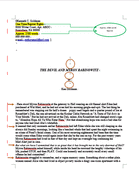 Before I begin, I just want to say that I'm taking a slightly different approach to critique. I'll start each with a discussion on . THE DEVIL AND MYRON RABINOWITZ by Ken Goldman A little about format. Okay, a lot. (You can open the picture in a larger window when you click on it.) The green marks: Word count could be moved to the right hand corner where an editor easily see this information. Ken could also put the reprint info over here, where it's easy to see.. I'd delete the Copyright information. It's always assumed to be that of the author unless otherwise stated. Usually, writers put copyright on their manuscripts not because they're afraid somebody will steal their story. Sometimes that's not the case, but it doesn't matter. The writer has indicated that he or she is afraid the editor will steal their work and that's paramount to calling them a thief. Here's one of many links discussing this. Now, Ken has won contests with this story before so there is information an editor might want to know such as the publication(s) it appeared and the date(s). This information is best handled in the cover letter. Title and by line should be centered. This format won't bother most editors, especially if they haven't linked a page about standard manuscript format. But if they have and the link shows a centered title but you do right justify, you could be saying, "I don't take direction well." You can set extra space before and after the start of a new paragraph. When you hit a hard return word will insert 6 points, 12 points 72, whatever floats your boat.This might not seem important, but the editor has a little extra work because the title has been formatted and the body text has not. It's also really hard to read. With digital files it's easy for an editor double space a file. I'll add the caveat that a writer should never count on any slush pile reader to do this. 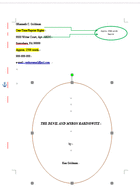 Watch what happens when I double space. I hit ctrl A to select all to highlight the entire document and click double space under paragraph. The author's info would be deleted for publication (Notice the editorial staff can't just copy, the address. They have to remove the other information first.) it's often copied for records, but to fix the title page the editor has to delete the extra hard returns and remove that extra spacing as well.
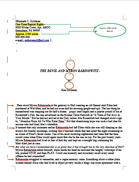 Critique: Here stood Myron Rabinowitz at the gateway to Hell wearing an old flannel shirt Edna had purchased at Wal-Mart, and he had not even had his morning gargle-and-spit. The last thing he remembered was stepping out for half a dozen poppy seed bagels and a quarter pound of lox at Rosenblatt’s Deli, the one advertised on the Kosher Cable Network as “A Taste of Tel-Aviv in Your Mouth.” But he had not arrived at the Deli, unless Abe Rosenblatt had changed the store's sign to, read “Abandon Hope All Ye Who Enter Here.” Not that it abandoning hope was such a bad idea for anyone who had tried Abe’s whitefish. It seemed that only moments earlier Rabinowitz had left Edna while she was still sleeping as she always did Sunday mornings, looking like a beached whale that had spent the night swimming in an ocean of Pond’s facial cream. One of his most recurring nightmares had been that the time would come when Edna would again insist that she be the one on top. For the past twenty years Myron Rabinowitz had lived in fear of that day and kept an overnight bag containing his Med-Alert just in case. I would suggest deleting the first sentence because it preforms the function of preparing readers for the next sentence. In this case we have a pre-hook, followed by a hook, but pump primers can appear anywhere in a story. I try to be ruthless with them when I edit my own work. They are unnecessary telling that softens the punch of whatever follows. The only appropriate place for these are times when a writer wishes to soften a blow. For example, if write about the death of any animal-- readers generally don't like it when children or pets die -- this can prepare the reader for that event. (Take special note of unnecessary. I'm a firm believer in show and tell.) The next changes pretty self-explanatory-- it's understood that the flannel shirt was purchased for him and poppy seed was misspelled. On to " wound up." (You probably don't care, but wound up is called a phrasal verb.) Sometimes you'll hear or read that you're supposed to eradicate verbs that are followed by a preposition. For the most part I agree, but that's not why I targeted this one. Wound up has several meanings: He wound up the clock. (He twisted the spring so the clock would keep time.) The children are wound up. The children are excited. We wound up at the park. They arrived at the park by accident. In certain situation it could also indicate where they finished their day. Let's look at another example: Mary shot up during her teen years. Did she get taller or do drugs? Changing certain verbal phrases will affect how quickly the sentence is understood and thus greatly impact the reader's experience in a positive way. However, sometimes there is no better way to say what you want to say. Slow down, please. Here, the verbal phrase is very clear and there is no equivalent. Sit down, please. Here, we could eliminate down without losing meaning. Yet, depending on the surrounding sentences and author's style, we may not want to delete it just because we can. However, in most cases writers should be ruthless with phrasal verbs as they tend to make a story seem dense and slow. Moving on... But he had not wound up at the Deli, unless Abe Rosenblatt had changed the sign in front of his store to read “Abandon Hope All Ye Who Enter Here.” This construction answers both, what changed and which what changed. Confused? Of course you are. There's a lot of grammar jargon I could use to explain why this isn't just an issue of artistic license, but here's a simple rule of thumb. Whenever you can rewrite a preposition that answers which thing (in this case which sign) with a possessive noun or pronoun, readers will easily understand the entire sentence. But he had not arrived at the Deli, unless Abe Rosenblatt had changed the store's sign to read, “Abandon Hope All Ye Who Enter Here.” To me, while there are plenty of little adjustments that could make this story easier on the reader, there's a larger, unresolved issue with pace and story arch. Let's look at the first sentence of the second paragraph. It seemed that only moments earlier Rabinowitz had left Edna while she was still sleeping as she always did Sunday mornings, looking like a beached whale that had spent the night swimming in an ocean of Pond’s facial cream. On the sentence level this is a beautiful sentence. This story is chock full of stuff like this. But when we pull back and look at the larger picture, the story gets stuck in first gear. While the first paragraph promises an interesting, active pace, the second paragraph doesn't deliver. Let me illustrate: Here stood Myron Rabinowitz at the gateway to Hell wearing an old flannel shirt Edna had purchased at Wal-Mart, and he had not even had his morning gargle-and-spit. The last thing he remembered was stepping out for half a dozen poppy seed bagels and a quarter pound of lox at Rosenblatt’s Deli, the one advertised on the Kosher Cable Network as “A Taste of Tel-Aviv in Your Mouth.” Here stood Myron Rabinowitz at the gateway to Hell wearing an old flannel shirt Edna had purchased at Wal-Mart, and he had not even had his morning gargle-and-spit. It seemed that only moments earlier Rabinowitz had left Edna while she was still sleeping as she always did Sunday mornings, looking like a beached whale that had spent the night swimming in an ocean of Pond’s facial cream. Both paragraphs fit behind the hook. Both paragraphs are equally well written. They both are also back story that encompass a similar pint in time. Keeping them both creates a first page that treads on the accelerator and the break. Now, this story has it's flaws but it's won some contests and been reprinted as recently as 2002. It's funny and cute, and I enjoyed it. Nothing you write will ever be perfect and it doesn't need to be. It just needs to resonate with the person reading it. But an editor will can't say "yes" if they never see the story. In other words, don't be afraid to put yourself out there. Ken, thank you for participating in the story critique. M.R. Here is a link to standard shorty story manuscript format. A lot of publications will actually like to this in their guidelines. I suggest we read it before we begin. Did you read it? No really, did you read it? There's no way you read it that fast. Go back and do it again, slowly. Okay, now that's the ticket! So below are screenshots of the stories we're going to critique. Before we look the stories closely, let's look at first impressions. You can click on them to see a larger picture. Who made the best first impression? Now look again and answer:
How can each author improve their first impression? Please remember, this is not about tearing up the authors. You may answer these questions in the comments or make general comments but be aware of how you phrase things. Last but not least, lets thank the authors for bravely putting themselves in the public eye so we can all learn. Authors, thank you so very much. When I posted the contest, I asked for standard manuscript format. Only three writers were in the ball park and only one hit a home run. Now, for the purpose of my contest, I didn't take points away for this but it did come into consideration when I was deciding between first and second place. Anyway, since so many got it wrong, I thought I'd take some time on this in the critiques. So why is standard manuscript format important?  Scenario 1: I didn't know. This is Jim. He's living at his sister's house while he gets back on his feet. His aspirations are obtainable. He just wants to serve you fries and a hamburger. His sister tells him, "If you'd put your pants McDonald's will hire you." He blinks at his sister and asks, "What are pants?" "How the *&^%! do you not know what pants are!" His sister shouts. A writer who doesn't know standard manuscript format is a like a guy in his mid 30's who has managed to get through life without knowing what a pair of pants are. The information is out there. A Google search for "short story manuscript format" will turn up lots of information. Now, some of the information is different, but it's better to show up for an interview in brown pants, than not pants at all.  Scenario 2. My writing will speak for itself. This is Laura. She used to be the CEO of a fortune five hundred company. But hard times hit, and she burned through her golden parachute. The bank recently repossessed her Ferrari and now she needs a car. To get a car she needs a job. She just had an interview with Papa John's Pizza for district supervisor. During the interview, the VP said, " So your resume` looks great. It's better than most. I'm just curios. Why didn't you wear pants? " Laura shrugged. "I didn't feel I needed them. My work history will speak for itself." Good writing does speak for itself, but let me ask, how easy do you think Laura will be to work with? Editors must balance the needs of the publication against the needs of the writer against the needs of the audience. When you ignore guidelines, you could send a message to the editor that you're hard to work with.  Scenario 3. I'm just following the crowd. This is Kim. Everyone in her family agreed that dressing like a vampire for a role as a vampire was a great idea. With a little research, Kim would realized this was a bad idea. Instead, she walked out on stage and the director shouted "Next!" "But I didn't audition." "Did you read the ad?" "Yes. It said street clothes but my mother said this was a great idea." Because people close to Kim supported her idea, she decided to ignore the casting call. Submission guidelines can be confusing and there's a lot of misinformation floating around. But part of your job is figuring out what's correct. The best way to do that is by reading a lot of submission guidelines. If you read enough of them, you'll notice that 97% want standard format, you'll learn what that is, and also get an understanding of some special things you'll commonly be asked to do. Never put the advise of your, mother, your best friend or your writer's group above the publication. The people who pay you are the only ones you should listen to. There are a thousand reasons why authors get this wrong but I don't need to write them all down to make my point. The condition of your manuscript sets the editors expectations and tells the editor a lot about who you are and how important this is to. And look, even I screw this up. I recently got rejected because a sent .doc instead of an .rtf =(
|
Categories
All
Archives
May 2022
|
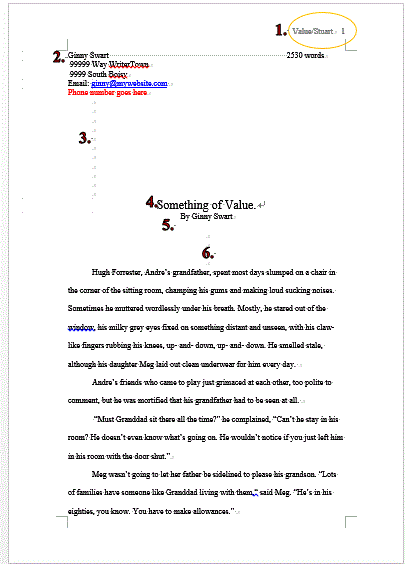


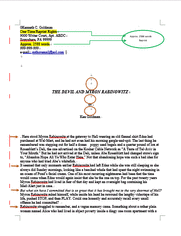
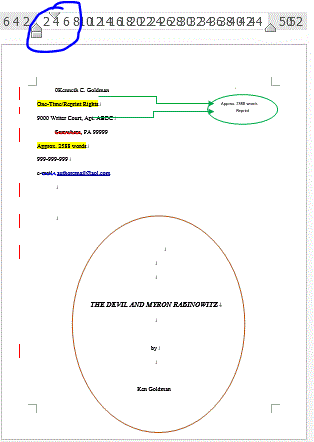
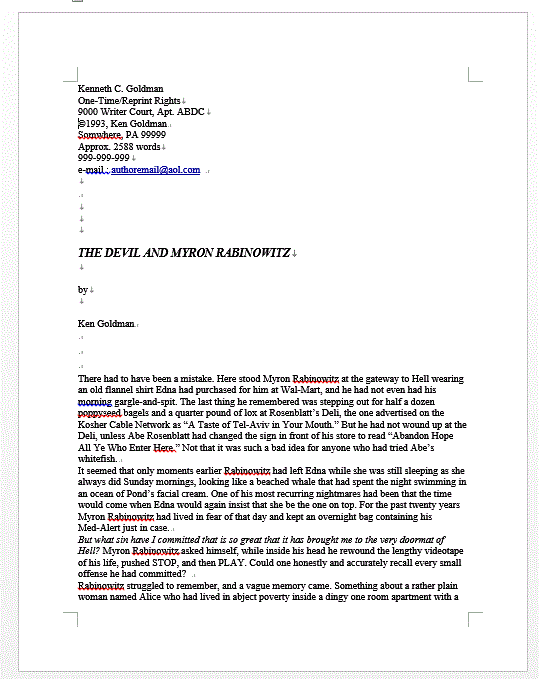
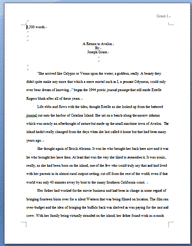
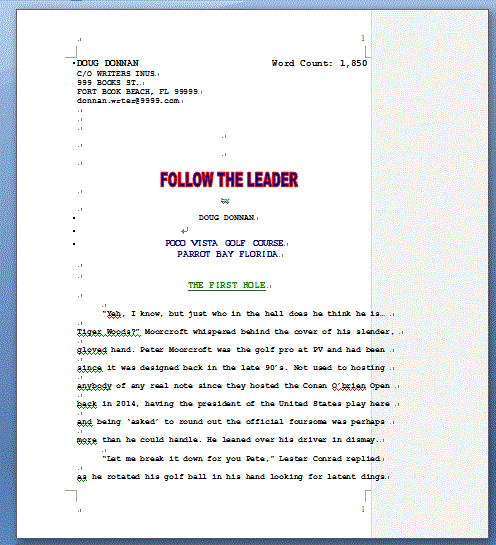
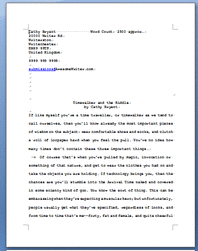
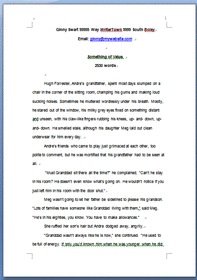
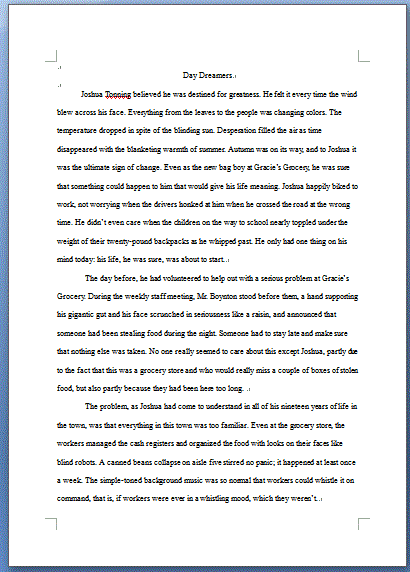
 RSS Feed
RSS Feed


